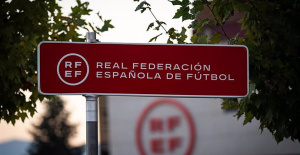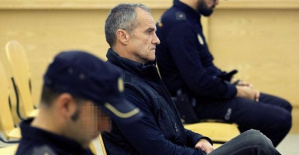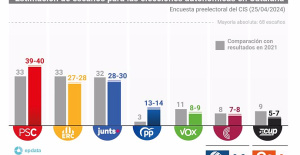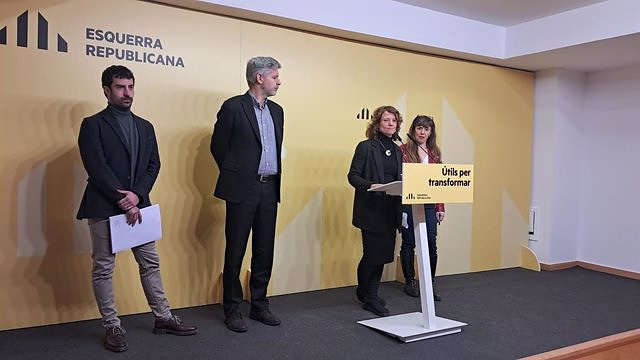BARCELONA, 25 Ene. (EUROPA PRESS) -
Those convicted of ERC for 1-O will appeal "any resolution that does not apply the most favorable law" in the review of the sentence of the Supreme Court (TS) after the penal reform that repealed sedition and modified embezzlement.
"If the interpretation made by the Supreme Court does not apply the most favorable law, which is what the law obliges it to do, this resolution will have to be appealed," said lawyer Andreu Van den Eynde this Wednesday in a press conference together with the lawyer Olga Arderiu, lawyer Raimon Tomàs and ERC's Vice-Secretary General for Derechos, Libertades y Lucha Antirepresiva, Marta Vilaret.
Van den Eynde has specified that this eventual appeal would be presented before the Supreme Court itself and that later the decision can also be appealed in the Constitutional Court (TC) and later in the European Court of Human Rights (ECHR).
On Tuesday, the leader of ERC, Oriol Junqueras, the former ministers Raül Romeva and Dolors Bassa, and the former president of Parliament Carme Forcadell asked the Supreme Court to acquit them in the process of reviewing the sentence, and this Wednesday the Prosecutor's Office has asked the court that maintains penalties of disqualification for those convicted of 1-O.
When asked about the possibility of the court applying the attenuated modality of embezzlement, Van den Eynde stated that this option "is not acceptable".
He has remarked that the 1-O sentence "does not speak or make mention anywhere of any profit motive" -which is now a requirement for serious embezzlement- and believes that the facts proven in the sentence do not allow them to be convicted of this crime.
Another argument of the defenses to withdraw the conviction for embezzlement is that this was applied as a medial crime, that is, necessary to achieve a final crime - sedition - which with the reform has declined from the Penal Code.
Arderiu, who is a lawyer for Forcadell - who was only convicted of sedition - has assessed that public disorder "are not applicable at all" to replace the disappeared sedition, as the Prosecutor's Office has raised.
In this sense, he recalled that in the review of the sentence, the facts that the sentence declared proven cannot be modified and that "they focus on the sedition modality of acting outside the legal channels, but they do not focus on the modality to act with force, violence or intimidation".
In the case of Forcadell, she was convicted of sedition for drawing up regulations in Parliament, which for Arderiu makes it "impossibly clearer" that it cannot be framed in disorder.
Regarding the order of the 1-O instructor Pablo Llarena, who agreed to withdraw the sedition but maintained the disobedience and embezzlement, Vilaret has described it as "a coup d'état, this interpretation that Llarena is making is obviating this desire for explicit reform of embezzlement".
"There is an evident open war, without nuances, not only with the reform of the Criminal Code but also with the law of 'only yes is yes'. There is a war of powers of this judiciary kidnapped by the right and the extreme right to maintain their margin of power", has assessed Vilaret.

 Exploring Cardano: Inner Workings and Advantages of this Cryptocurrency
Exploring Cardano: Inner Workings and Advantages of this Cryptocurrency Seville.- Economy.- Innova.- STSA inaugurates its new painting and sealing hangar in San Pablo, for 18 million
Seville.- Economy.- Innova.- STSA inaugurates its new painting and sealing hangar in San Pablo, for 18 million Innova.- More than 300 volunteers join the Andalucía Compromiso Digital network in one month to facilitate access to ICT
Innova.- More than 300 volunteers join the Andalucía Compromiso Digital network in one month to facilitate access to ICT Innova.-AMP.- Ayesa acquires 51% of Sadiel, which will create new technological engineering products and expand markets
Innova.-AMP.- Ayesa acquires 51% of Sadiel, which will create new technological engineering products and expand markets A Commission created by the CSD will supervise the RFEF
A Commission created by the CSD will supervise the RFEF The AN judge prosecutes the former ETA leader for her responsibility in the kidnapping and murder of Miguel Ángel Blanco
The AN judge prosecutes the former ETA leader for her responsibility in the kidnapping and murder of Miguel Ángel Blanco The European Parliament condemns the contacts of the Catalan independence movement with Russia and demands an investigation
The European Parliament condemns the contacts of the Catalan independence movement with Russia and demands an investigation The PSC would win the Catalan elections with 39-40 seats, Junts would obtain 28-30 and ERC 27-28, according to the CIS
The PSC would win the Catalan elections with 39-40 seats, Junts would obtain 28-30 and ERC 27-28, according to the CIS How Blockchain in being used to shape the future
How Blockchain in being used to shape the future Not just BTC and ETH: Here Are Some More Interesting Coins Worth Focusing on
Not just BTC and ETH: Here Are Some More Interesting Coins Worth Focusing on Retrópolis brings the golden age of video games and computing to the UPV
Retrópolis brings the golden age of video games and computing to the UPV Looking for video games that value the neighborhoods of Valencia
Looking for video games that value the neighborhoods of Valencia UPV researchers improve the efficiency of air conditioning systems using a geothermal heat pump
UPV researchers improve the efficiency of air conditioning systems using a geothermal heat pump València is committed to citiverse and smart tourism to be "the reference technological hub of the Mediterranean"
València is committed to citiverse and smart tourism to be "the reference technological hub of the Mediterranean" A million people demonstrate in France against Macron's pension reform
A million people demonstrate in France against Macron's pension reform Russia launches several missiles against "critical infrastructure" in the city of Zaporizhia
Russia launches several missiles against "critical infrastructure" in the city of Zaporizhia A "procession" remembers the dead of the Calabria shipwreck as bodies continue to wash up on the shore
A "procession" remembers the dead of the Calabria shipwreck as bodies continue to wash up on the shore Prison sentences handed down for three prominent Hong Kong pro-democracy activists
Prison sentences handed down for three prominent Hong Kong pro-democracy activists ETH continues to leave trading platforms, Ethereum balance on exchanges lowest in 3 years
ETH continues to leave trading platforms, Ethereum balance on exchanges lowest in 3 years Investors invest $450 million in Consensys, Ethereum incubator now valued at $7 billion
Investors invest $450 million in Consensys, Ethereum incubator now valued at $7 billion Alchemy Integrates Ethereum L2 Product Starknet to Enhance Web3 Scalability at a Price 100x Lower Than L1 Fees
Alchemy Integrates Ethereum L2 Product Starknet to Enhance Web3 Scalability at a Price 100x Lower Than L1 Fees Mining Report: Bitcoin's Electricity Consumption Declines by 25% in Q1 2022
Mining Report: Bitcoin's Electricity Consumption Declines by 25% in Q1 2022 Oil-to-Bitcoin Mining Firm Crusoe Energy Systems Raised $505 Million
Oil-to-Bitcoin Mining Firm Crusoe Energy Systems Raised $505 Million Microbt reveals the latest Bitcoin mining rigs -- Machines produce up to 126 TH/s with custom 5nm chip design
Microbt reveals the latest Bitcoin mining rigs -- Machines produce up to 126 TH/s with custom 5nm chip design Bitcoin's Mining Difficulty Hits a Lifetime High, With More Than 90% of BTC Supply Issued
Bitcoin's Mining Difficulty Hits a Lifetime High, With More Than 90% of BTC Supply Issued The Biggest Movers are Near, EOS, and RUNE during Friday's Selloff
The Biggest Movers are Near, EOS, and RUNE during Friday's Selloff Global Markets Spooked by a Hawkish Fed and Covid, Stocks and Crypto Gain After Musk Buys Twitter
Global Markets Spooked by a Hawkish Fed and Covid, Stocks and Crypto Gain After Musk Buys Twitter Bitso to offset carbon emissions from the Trading Platform's ERC20, ETH, and BTC Transactions
Bitso to offset carbon emissions from the Trading Platform's ERC20, ETH, and BTC Transactions Draftkings Announces 2022 College Hoops NFT Selection for March Madness
Draftkings Announces 2022 College Hoops NFT Selection for March Madness























